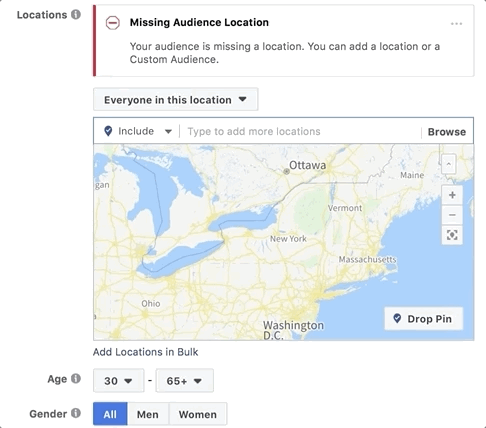Gary Vaynerchuk's Blog, page 29
March 8, 2019
Stop Living For The Weekend
I hate Fridays.
Work is something I genuinely love — and it’s not fun for me to see that end each week. I look forward to Mondays.
But in the recent years, I’ve been really fascinated by those who are cheering for the opposite. So many people hate their jobs or where they work, and they see Friday as a “relief” from the rest of the week.
If that’s you… I want to really put some pressure on that conversation today.
First — I want to create some clarity:
I’m not writing this article to talk about how “lucky” I am that I get to do what I love, nor am I disrespecting people who look forward to spending time with their family on the weekends. I’m a big believer in spending my weekends with my family.
I’m writing this article for one person who is stuck in a job that makes them unhappy to wake up and ask themselves “wait, what am I actually doing here?”
The truth is, if you factor out sleep, you basically live to work. It makes up the majority of your life. If you’re unhappy at work, then it’s time to take a step back and ask yourself what you’re actually doing — not by judging yourself or beating yourself up, but by thoughtfully analyzing what you could do to change your situation.

What to do if you dread Mondays
Listen, I’m empathetic to this. I used to look forward to Fridays so much when I was in school. I used to dread Mondays and would be praying for giant snowstorms every winter so that school would be closed.
I lived in that mindset for 12 years.
The thought that this is how so many people live their work lives breaks my heart.
But at the same time, I respect practicality. I get the fact that people have bills and other responsibilities that keep them tied to jobs.
Here are some of my thoughts on how to get around it:
1. Change your bills
So many people are stuck in jobs they don’t like because they buy stuff they don’t need.
If you have “bills to pay”, change your bills.
Look, I get that there are things like student loan debt which you can’t just “change” or get out of. But there are a lot of people who are buying brand name hoodies or sneakers thinking that it will help them “close the gap” on their insecurities. Same thing with cars, fancy homes, and so many other things that people buy to posture to other people. But it forces you to stay at a job you don’t like and causes more unhappiness in the long term.
If you’re unhappy at your job, really consider selling your home, your car, the junk in your garage that you’ve never used in years, or your old clothes. Move to a smaller apartment with lower rent. Think about whether you actually “need” something, or if it’s taking away more happiness than its giving you.
It’ll give you more air cover to go after a better job, a side hustle, or a business that you’re actually passionate about.
You can choose what your bills are, to a large degree.
2. Evaluate your strengths and weaknesses
Not everyone is meant to be an entrepreneur, and that’s fine. Maybe the answer for you is to find a job at a different company, or go after a better job that makes you happier.
The first step here is to get real self-aware about what your skills and ambitions are.
Take the five to ten people that know you the best. Split them into two categories: people you connect with on a deep level of love, and people who you are close with, but maybe you’re a little different in lifestyle and personality.
Then, ask one person from each category to honestly tell you what they think you’re best at, and what they think you’re worst at. “What are my skills and abilities, and what are my weaknesses?”
Are you the type of person who would find happiness by quitting your job and starting a business? Or would you be happier getting a different job? Or do you just need a side hustle you can do in the evenings and weekends for more money?
I truly believe that collecting market research and creating an atmosphere that allows someone to be honest with you are the two big things that’ll help you evaluate your skills.
3. Look into practical side hustles
One way to give yourself the ability to pay the bills you need to pay and quit a job that makes you unhappy is by building a side hustle.
For most people, I recommend selling stuff on eBay because it requires no up front capital or investment.
Here’s how:
1. Go to Craigslist.
2. Under the “for sale” tab, there’s a section called “free.” Click that.
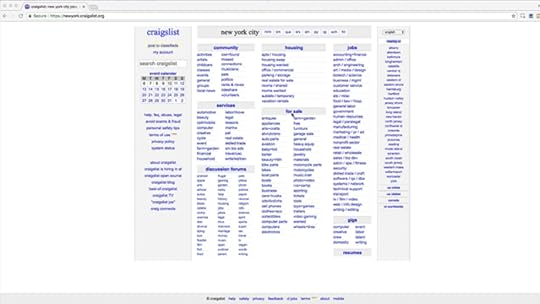
3. You’ll find a bunch of things that people want to get rid of — couches, TVs, etc.
4. Drive to their spot and pick it up (or take the bus if you don’t have a car).
5. Take the item.
6. Go back home.
7. Take a picture of it.
8. List it on eBay or Facebook Marketplace and wait till it sells.
If you have a little bit of cash to invest up front, you can hit up garage sales in your local area, find items that people are selling, buy them, and flip them on eBay for a bigger profit.
You can check what each item is worth in real time on the eBay mobile app — just search the item and select the “sold listings” filter.
[image error]
Can’t wait for more of you to execute on this advice and get on the path to finding happiness instead of making money to “feed” your bills 
March 6, 2019
4 LinkedIn Marketing Strategies for 2019
LinkedIn marketing is something I really, really believe in for 2019.
LinkedIn has transformed so much as a platform. Years ago, it used to just be for job seekers. People would post resumes, and only connect with people they knew and no one else.
Now, it’s become more of a content platform.
People share status updates, articles, and interact with each other within a business or professional context. And because the platform is still relatively early, they’ve made the organic reach insanely high.
It’s where Facebook was at 5-7 years ago.
In this article, I talk about some strategies and ideas on using LinkedIn to grow followers and get actual business results for your organization.
The only way to build a big audience online
You have to understand what value is. That’s the only way to get really big.
It took me 10 years to get to 1.8 million followers on Twitter. And it’s taken me 3 years to get to 5.2 million followers on Instagram.
It’s because I understand what “value” is on Instagram. I know how people consume content and how to make my content the most contextual to that platform.
I believe value comes in two basic forms:
Entertainment.
Education.
For example, on Instagram, entertainment can come in the form of being very attractive, being funny, or a number of other ways.
Education can come in a number of different ways.
But the problem is… most people create content that’s not built to entertain or educate. They create content that’s in their own self-interest instead of thinking about what value the end consumer is getting out of it.
Here are some marketing strategies and ideas on how to build an audience on LinkedIn by giving value to other people first:
1. Use the $1.80 strategy for LinkedIn
The $1.80 strategy is a concept I came up with a couple of years ago when people were asking me how to build audience on Instagram.
My advice was to find the top performing posts in your space by searching relevant hashtags or looking at the “top posts” in your area — and add your “two cents” in the comments.
Not fluff comments that so many bots leave, but something meaningful that shows that you actually consumed the piece of content.
Do that 90 times a day, and you’ll start building a community and a personal brand.
What people don’t realize is, the same strategy can apply to LinkedIn.
There are different ways you can find trending posts …
You can look at the “What People Are Talking About Now” section to see what news topics are trending.
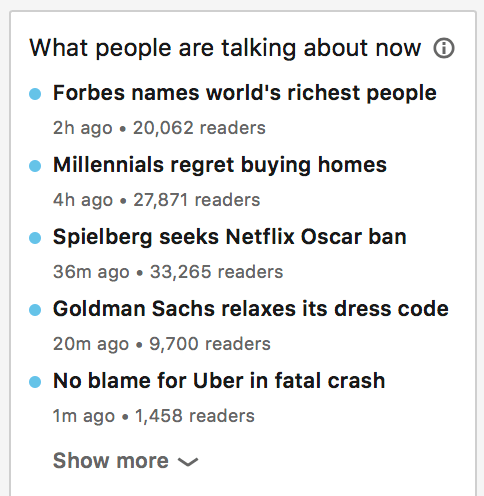
If you click on them, you’ll see posts from people who are adding their two cents to the topic in the form of status updates:
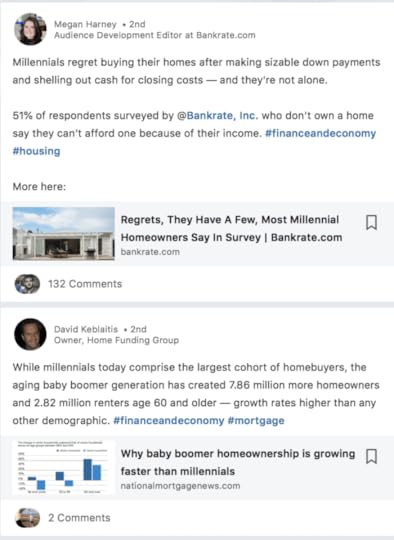
You can share your own POV along with an article on the topic that you find interesting.
You also can search the top 5, 10, or 20 hashtags related to your field, click on them, and see what people are talking about:

Go through the posts, and comment on anything you find interesting.
You can also follow influencers and leave thoughtful comments on the content they post.
There are so many different ways to engage. If you leave the best comment on a post that gets a lot of reach, people will notice — especially if you stay consistent with it.
The reason why most people don’t do it is because it’s hard to implement. It’s hard to really consume 90 pieces of content a day and leave a thoughtful comment on each of them.
But if you want to build a community of followers, you have to care about adding value to the community before you can expect them to care about you.
2. Write native articles on LinkedIn
There are two ways to “attack” content:
Either engage with it, or produce it.
The $1.80 strategy is about engagement. It’s about seeing what posts and topics can be relevant to the niche you’re playing in, and leaving thoughtful comments to build a following.
The other way to do it is by actually producing content through video, written, or audio form. One thing that I’m seeing get a lot of traction on LinkedIn is native articles and text posts with content contextual to business.

For example, if you’re a travel company, you might be posting a bunch of beautiful travel photos on Instagram. But on LinkedIn, the right way to do it would be writing an article about something like, say, how CEOs can travel more efficiently.
(It depends on your market and your ambition, but you see where I’m going with this).
3. Add your profile link to your email signature
When you create content and publish it on LinkedIn, the people who see it are those who follow you (or are connected with you) and those who follow the hashtags that you’re including.
Here’s one hack to build your audience if you’re starting out without many connections:
If you’re someone who sends a lot of email from your personal or business account, add your LinkedIn profile to your email signature.
It’s a quick way to get more exposure to your LinkedIn profile and get more followers. As you get more and more connections, it could be the match that starts the process of your content getting higher reach.
4. Don’t spam out messages
What doesn’t work on LinkedIn is spamming people through messages.
The thing that blows me away is, so many salespeople and entrepreneurs get spammy LinkedIn messages and hate receiving them — yet they’re so willing to spam other people.
There’s a lot of tone deafness and hypocrisy there because the truth is, it’s just not the best way to build a following and extract value out of LinkedIn.
The proper way to do it is by giving value to the community first by producing or engaging with content.
Let me know if you found this valuable 
February 28, 2019
10 Examples of Positivity on Social Media
Finding kindness and positivity on social media is super easy.
So is finding hate and negativity.
I’m a firm believer that you find what you’re looking for. So many people talk about how social media is tearing people down or that there’s so much hate on every platform. But there’s so much empathy, kindness, and positivity too.
You just have to find it.
I’m writing this article in hopes that it will help a few of you look at things differently and seek out positivity instead of negativity in your online behavior.
Here are some examples of positivity I found from Twitter search:
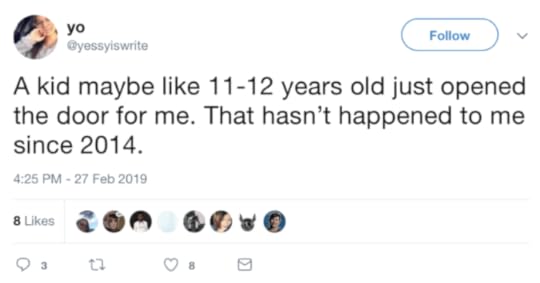
“A kid maybe like 11-12 years old just opened the door for me. That hasn’t happened to me since 2014.” – @yessyiswrite
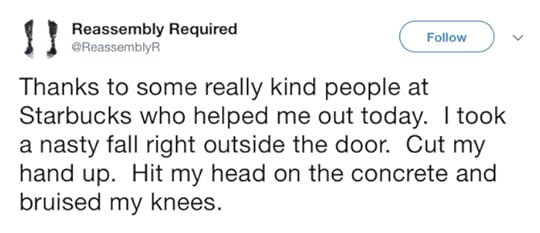
“Thanks to some really kind people at Starbucks who helped me out today. I took a nasty fall right outside my door. Cut my hand up. Hit my head on the concrete and bruised my knees.” – @ReassemblyR

“My sister is having a baby girl and I’m so excited. I’m going to be an amazing aunt to a wonderful baby girl!” – @InimitableArts

“To be nominated and recognized in such a massive way by University and by DUSA is completely overwhelming. I’m so grateful! I honestly just hope that future students at the University of Dundee feel a benefit from my time as School President.” – @garadith

“Being told you’re beautiful by a random stranger and not in a cat call way. Just a lovely woman telling another woman she’s beautiful. #PayItForward” – @Lopezinq

“People are being extra nice today and I LOVE IT.” – @AmandaMoreno72

“Thank you to the very nice young man and woman who helped push my car out of a snowy ditch that I got stuck in just now when trying to stop and take a photo – misjudged the lack of shoulder on the road with all the snow.” – @IAStartingLine
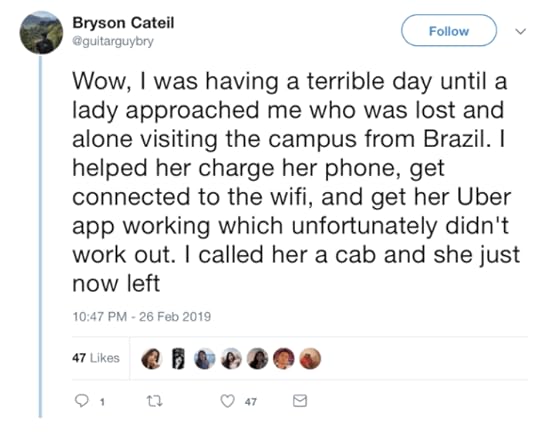
“Wow, I was having a terrible day until a lady approached me who was lost and alone visiting the campus from Brazil. I helped her charge her phone, get connected to wifi, and get her Uber app working which unfortunately didn’t work out. I called her a cab and she just now left.” – @guitarguybry

“My 17-year-old son just showed me his school paper saying, “First time using footnotes!” I’m having a proud writer mom moment. My baby’s growing up!” – @LauraKatePalmer
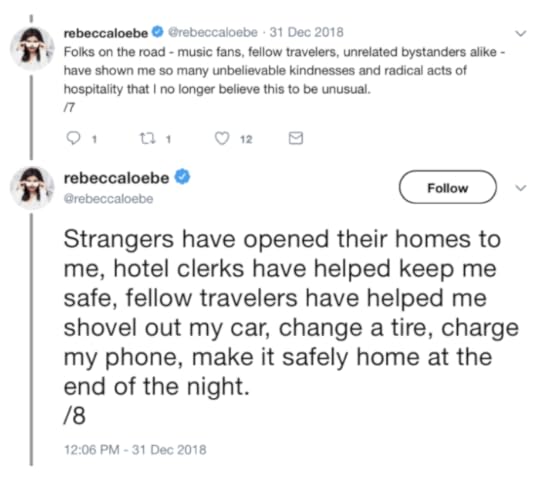
“Strangers have opened their homes to me, hotel clerks have helped keep me safe, fellow travelers have helped me shovel out my car, change a tire, charge my phone, make it safely home at the end of the night.” – @rebeccaloebe
Social media is “exposing” our mindset
I’ve talked a lot before about how social media isn’t changing us. It’s exposing us.
Social media platforms don’t show you random content that you don’t want to consume. They don’t push negativity on anyone.
They just show you content that you (or people similar to you) respond to — either through its algorithm, or the topics / people you’ve decided to follow. If you don’t like the content you’re seeing on social media, it would be really valuable to take a closer look at your own consumption behavior – both online and offline.
Forget about social media for a second. Ask yourself… are you looking for positivity or negativity in the “real world”? Do you notice the random acts of kindness that happen around you? Do you believe “nice guys finish last“? Do you notice people being nice to each other at work, or do you mainly notice people tearing each other down? Do you notice people giving to one another without expectation, owning their truths, and being kind?
Social media platforms just give us a new “medium” to act out the same old behaviors that we acted out before – and in my point of view, they’re being unfairly demonized for negative effects in society.
In most cases, they “feed” us the sort of things that we already want to consume.
In closing… here’s my challenge to you:
Spend the next 24 hours looking for “the good.” Look for the kindness, positivity, and empathy. Look at the world “glass half full.”
Just 24 hours of looking for the good could change your life forever once you see what starts happening to your mindset.
If you’ll commit to this, tweet me @GaryVee with the hashtag #GaryVeePositivityChallenge and share something positive that happened in your day 
February 27, 2019
7 Important Ideas for First Time Managers in 2019
Many first time managers face significant challenges as they go from a place as someone who “executes” to someone who’s responsible for a team.
Here are some tips to remember if you’re transitioning to a management role for the first time:
1. Understand that you work for your employees, they don’t work for you
This one is hard for a lot of leaders to understand.
Most new managers think that becoming a manager is the “graduation.” Truth is, it’s the reverse.
Leaders work for their employees.
That means you have to understand what your employees want at a deep level. You have to be constantly adapting to their needs and what they want from the organization.
For example, one of my employees might want higher pay when he’s 24. But maybe he falls in love at 28 and decides he wants to spend more time with his family. Another might be more interested in a fancy title. Another might want to get access to me and build a relationship. Another might want to go to one of our international offices and work there.
There are a million different variables, and it’s on you as a leader to adjust to reality as it changes.
When you go from being someone who “executes” to someone who’s managing a team, you go from trading on IQ to trading on EQ. You go from doing the actual work to listening to employees, catering to what they want, taking blame, and being the bigger person.
The best managers are actually the best mentors.
2. Lead with empathy and kindness
Empathy and kindness are two massively underrated qualities when it comes to leading a team. They’re not qualities that most people would think makes a good leader, but I believe in them so much.
I genuinely believe that the best leadership qualities are maternal, not paternal. It’s a lot more appropriate and helpful to have a caring, empathetic, understanding personality when you’re a leader than something stern, paternal, or aggressive.
A lot of people overlook the idea that showing emotion is important.
Even if you already think of yourself as an empathetic or kind person, becoming a manager will change how you practically apply that empathy.
A lot of this just comes down to self-esteem. If you’re not secure in yourself, you’re not going to feel as comfortable being kind, positive, and empathetic to other people. It won’t come as natural to build someone up (instead of tear them down). It’s why so many leaders lead with aggressive, mean personalities. Many of them are just insecure on the inside and they project that insecurity on their understudies.
At VaynerMedia, you can’t lead with ego. We suffocate that out. People who lead with negativity and ego get fired really quickly.
3. To Build Culture, Focus on Firing
When I hire, I do look for certain qualities.
For example… emotional intelligence matters above everything else. Then, I care about the actual tangible skills candidates have.
It’s not even close. If someone’s a jerk, I won’t hire them – even if their numbers are phenomenal. It’s similar to sports — a team that sticks together will end up beating a team of superstars that were put together for one season (over the long term).
Another big piece of advice I give is hiring people that complement your strengths. If you’re a visionary type of person, hire someone who is obsessed with excel and freaks out if you’re a minute late. Hire someone who loves details.
A lot of leaders get “caught” because they hire friends that are similar to them, but aren’t what they actually need.
But ultimately, to maintain great culture within your team, you have to do one thing:
Focus on firing.
In the early days of VaynerMedia I would hire people real easily — but I would fire quickly if and when I realized they weren’t a good fit on my team. It didn’t matter to me how great they were on paper or how talented they were — if they didn’t play well with the other people on the team, they were out.
If you don’t cut that “cancer” out quickly, your team will crumble long term.
4. Being nice is ROI positive
Truth is, you could have the greatest HR tools and software of all time to “monitor” how your employees are doing – but if you don’t actually care about your people at a deep level, you will lose. None of those tools are going to do anything.
As a leader, it’s my job to give my employees 51% of the value in the relationship.
But I’m not Mother Teresa. It’s just practical.
If you’re using negativity as a way to extract value from employees or people on your team, they’ll build resentment towards you and it’ll kill your culture long term.
I want to create a conversation around the practicality of positivity, kindness, and empathy within my organization. I’m not just saying it to be ideological — instilling those characteristics and traits as part of your culture has significant long term impact for your business. At VaynerMedia, Claude Silver, our “Chief Heart Officer”, is number two in the org chart at our company.
And if there’s ever a debate on what’s good for our employees vs what’s good for our bottom line, she’ll win that debate nine times out of ten.
Nice guys always win in the end.
5. Say “Yes” to Everything
As a leader, I’m very “yes” minded. I say “yes” to virtually everything.
I say “yes” to everything because I look at business as a net-net game.
Let’s say I say “yes” to 12 things, and 7 succeed. On one side, I won 7 times. On the other side, I have to deal with failures — including trying to make up for them because I have may have let people down directly or indirectly through those losses.
Even if it breaks down into those two categories, I will still take the 7 wins that resulted from saying “yes” to everything rather than just trying to do 2 or 3 with the goal of “getting them right.”
6. Give Trust Easily
I give trust a lot easier than most CEOs would.
I think it’s just smart. It’s offense.
The reason most people don’t give trust is because they fear losses. They’re afraid of an employee messing up, failing, or creating short term losses in business. But the truth is, at some point, you have to let your kid swim. You have to let your kid swing the bat.
And for me, I’d rather do that sooner than later.
Too many managers put restrictions around their employees, and then lift those restrictions as employees prove themselves. I’d rather give my employees unlimited trust in the beginning, and then slowly take that trust away if and when they do something to do lose it. That’s what helps me move fast.
Giving trust also minimizes the risk of micromanagement. When people who are amazing at execution move into a management role, they tend to still be in that “execution” mindset which leads them to be stuck doing other people’s work instead of focusing on managing the team.
But the problem is, most managers are either 1) afraid of short term losses that come with giving trust, or 2) they’re afraid of potentially allowing their understudies to be better than them.
7. Communicate with underperforming employees
There are different types of employees that you’ll have to deal with as a manager — underperforming employees that have strong talent, hardworking employees that aren’t talented, and more.
The way I deal with them is strong communication.
When you have the luxury of being the “judge and the jury” as a manager, the pressure and the onus is on you. If there are employees at VaynerMedia that are highly talented but underperforming, it’s my fault for not creating the infrastructure for them to shine.
Maybe their bosses aren’t “clicking” with them and that’s making them feel demotivated. Maybe they’re just in the wrong department. Maybe we haven’t asked the right questions when it comes to the interests they have.
If you have an employee that’s talented but underperforming, sit down with them in a meeting and ask them:
“Hey Rick, I noticed you have talent oozing out of your eyes but you’re not delivering on the hustle – and that’s an important variable here. What am I doing wrong? What’s the company doing wrong? How can we help you succeed?”
Unfortunately, most managers have conversations that go like “Rick, you’re being lazy. Step it up.”
When you’re a leader, you have to put the onus on you. You’re the one creating the rules of the game.
If you don’t like how it’s played, change the rules.
If you got value from this article, it would mean a lot to me if you could
share it on Twitter

February 26, 2019
Be Accountable, But Don’t Judge Yourself
I really believe that being accountable is one of the biggest keys to happiness.
When you’re accountable… when you take responsibility for things that go wrong (regardless of whether or not it’s actually your fault) … you’ll feel in control. You won’t feel helpless or feel like other people are controlling your life.
But here’s issue:
A lot of people are scared to be accountable because they don’t understand how being accountable is different from beating yourself up for your mistakes.
So they default into blaming other people.

I think people should blame themselves, but I don’t think they should judge themselves. I believe everyone should be their own “biggest fan” – beating yourself is super counterproductive, and something I don’t think anyone should do. I also think people should take responsibility for everything that happens in their lives.
Here are some mindset shifts on how you can use accountability as an “unlock” for more happiness:
Owning your faults and weaknesses takes away their leverage
We all suck at so many things.
I have tons of “weaknesses.”
I have virtually no writing skills. I was a D and F student. I curse on stage in my keynotes and it leaves a lot of opportunity on the table in terms of speaking gigs. I don’t feel comfortable reading out loud. I don’t consume information well through books. I don’t listen to “mentors.”
I’ve make a ton of mistakes, too. I make mistakes everyday at VaynerMedia.
I passed on investing in Uber in the early days because at the time, I had bought a new apartment. If I had invested, I would’ve made hundreds of millions of dollars.
You could make an argument saying that singular “loss” is greater than all of my “wins” in business.
But when you own your faults and weaknesses, it takes away the leverage they have over you – and they can almost become “strengths.”
I proudly talk about how I did terrible in school. I proudly talk about how I don’t listen to my mentors because I’m so “tuned in” to myself and my own voice. When you “own” what you’re bad at and what you messed up on, you become more comfortable with yourself.
Take Eminem in 8-Mile, for example.
One of my favorite scenes ever is the last rap battle of 8 mile where Eminem disses himself before the other guy can.
He owns all his weaknesses, and it leaves the other person with nothing to say.
The more you own (and share) your insecurities, failures, and mistakes with the world, the more comfortable you’ll get with yourself.
Own the fact that you’re a 20-something still trying to “figure out” life. Own the fact that you’re in your 60s and you’re starting a business from zero and you’re scared it’s “too late” because you didn’t start earlier. Because the truth is, there’s nothing wrong with any of those things – and once get comfortable with them, you’ll find that they can actually be your greatest strengths.
It’s okay to feel disappointed, but don’t dwell on it
When I say I don’t “beat myself up”, I don’t mean that I’m always incredibly proud of every decision I make.
I carefully analyze my behavior in an honest way. Sometimes, I’ll even be disappointed.
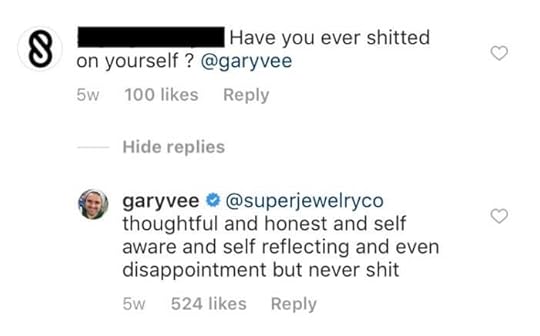
But I’ll never dwell or beat myself up.
That’s where the difference lies — people can have negative feelings or thoughts about failures and mistakes, but the minute you start dwelling on it, you’re making it more likely that your next thing won’t work.
And worse… you’re tearing yourself down even further instead of being your own biggest fan and supporting yourself..
Don’t wrap your self-esteem up in your “success”
This is a big reason why so many people default to blaming others.
They wrap up their self-esteem up in their successes.
Even though I identify so much as a businessman and entrepreneur, I’m proud that I don’t wrap my self-esteem up in my accomplishments. Even when I lose in business, I never lose my self-worth over it.
If I lost, I’m happy to deal with the ramifications of it – but I never allow myself to feel bad about who I am because of that loss.
I think a lot of this goes back to parenting.
Like I said… I was a D and F student in school. Everytime grades would come out, my mom would punish me for not doing well. She made me deal with the ramifications of getting bad grades, but she never made me feel like I was stupid or that I was not going to be successful.
It was accountability without judgement.
If you found this interesting please share the article on Twitter – would mean a lot to me 
February 25, 2019
4 Marketing Strategies for Real Estate Agents
If you’re a real estate agent or broker, you can significantly grow your leads, sales, and overall business by implementing one key marketing strategy:
Building a personal brand.
At January’s Agent2021 conference, I gave a lot of tactical advice to agents in the real estate, auto, mortgage, and insurance industries on building their personal brand and leveraging it in their respective industries.
Here are four personal branding strategies you can use to get ahead as a real estate agent:
1. Build your personal brand instead of just paying for referrals
In the real estate industry, most agents funnel money into lead gen sources like Trulia or Zillow to advertise homes.
That’s a sales tactic. You’re essentially paying a referral fee and capturing customers when they’re near the point of purchase. You’re paying an dollar amount to get a lead.
And that’s perfectly fine. I’m not saying real estate agents should avoid doing that. It can work well.
But the truth is, it’s FAR more valuable to build a brand so people come to you.
Companies like Zillow knew that Google search was going to be huge in the early days, and they ranked at the top of search for many of the high-intent keywords. They siphoned all the attention from people who were looking to buy homes, and now, they’re selling that attention back to real estate agents for a price.
But here’s the problem if you’re building your business off of sites like Zillow:
There are a LOT of people competing in the real estate game. And if you’re an individual agent, chances are there are a lot of bigger companies trying to sell homes in your area that have more money than you do.
They’d be competing for that same attention too.
If and when you go head to head with them, chances are you’ll lose because they’d be able to pay more for that attention than you can.
The best way to combat that?
Focus on building your personal and distributing your content across social platforms. That way, when people think about buying a home in a certain area, they think of you.
That’s how you differentiate.
Paying for leads on Zillow or Trulia isn’t a bad thing. If that’s working well for you, then you should keep doing it. But it’s not a good strategy over the long term because it leaves you vulnerable to the price of that attention and others competing for it.
You can build brand by putting out content and engaging with your community.
For example… go to Instagram, and navigate over to the “Places” tab.

Type in the city where you’re looking to sell homes.
Comment and engage with those posting in that area. Add your two cents to what they’re posting (without directly promoting yourself). Show that you’re a part of the community.
It’s what I did when I was building the “GaryVee” brand. I spent years replying to people on Twitter for 4 – 8 hours a day before people knew who I was..
Brand is how you differentiate yourself and win customers when you’re in a “commodity” business.
2. Figure out your value proposition and own your truth
A lot of real estate agents struggle with coming up with their “unique” value that separates themselves from other agents.
Your “value” is who you are. Based on your personality, you’ll appeal to different people.
Some buyers won’t buy from you because they don’t like the way you say “hello.” Literally. Other buyers are more technical. They might want to know all the specifics of the past homes you’ve sold in the past and make their decision based on that.
My advice is to first figure out what your value propositions are (i.e. if you can leverage your past experience, your charismatic personality, your detail oriented nature, etc), and then sell on offense, not defense.
In other words, too many real estate agents try to win deals by scaring customers away from the alternatives. They’re playing “defense.”
I think people should go on offense and sell according their personal strengths.
For example, I just really like good people. I like being friends with them and doing business with them. If I met a real estate agent who just struck me as an empathetic, kind, good person, I would be much more likely to buy an expensive home from them.
People make decisions based on humans. Not just in real estate, but in every business. That’s why owning your truth is so important.
Ask yourself… what are you about? Who are you? Are you caring? Are you driven by money and competition? Do you love the New York Knicks? Did you get bit by a spider at 7 years old?
Yes, your real estate experience is important. But people make decisions on who you are first – that’s where your unique value stems from.
3. Deliver content to your audience in the most effective way possible.
Delivering content about your day-to-day as a real estate agent is an incredibly powerful way to build your brand.
In other words, document your life — as much as you’re comfortable with.
A lot of people tell me that their lives are not “interesting enough” or that people won’t want to watch a “show” based around them. But the truth is, everyone is interesting. Everyone is relatable. It’s just that we tend to take the things that happen in our lives for granted.
I guarantee you there are things that happen in your office everyday that would be hilarious to other people, but you might take it for granted because it happens everyday. If you document your day, those things will come to the surface.
If you’re really not comfortable with that, you might also do a Q&A show where you answer questions people have about buying homes, so that when people type in the question in Google, your video pops up.
If you’re good on audio, you might do a podcast where you interview different people in your town about what they think about buying homes and real estate in your area.
You can distribute that content through Facebook or Instagram advertising by targeting people in your town (or the town where you’re selling homes).
4. Become the “mayor” of your town
If I were an agent, my main marketing strategy would be reviewing the areas around the places where I’m selling homes.
Become the “popular person” in your town.
I would interview the teachers and talk to them about the school system. I would review the subway system, the other local businesses, or the wine shop. I would interview people who have lived in the town for 50+ years.
There are a lot of different reasons people buy homes.
Sure, they might do it because it’s close to their work. But they also pick homes based on the things to do and the “amenities” in that area — the school systems, the playground, crime, the stores, attractions, and other things.
If you create content reviewing the establishments in a 10-20 mile radius where you sell homes, you’ll create emotional appeal around your area that would persuade people to buy in your area.
And because you were their source of information, they’d be more likely to buy from you.
Why Modern Real Estate Marketing is So Hard
Real estate has traditionally been a sales-driven industry.
That’s why most agents aren’t doing these marketing strategies — they’re more focused on short term sales than they are on brand.
When you’re interviewing teachers and business owners and promoting those interviews by running ads in your area, you might not see results for the first couple of months. You might spend a few hundred or a few thousand dollars without seeing anything come from it.
And that’s where people give up.
In sales-driven industries like real estate, people don’t like investing money in things where they don’t see immediate ROI — and brand takes time to build up.
But real estate agents who invest in their brand will significantly outsell their competition.
Listen to the full podcast episode where I talk more about this on Spotify:
February 24, 2019
I Love Selling. Here’s Why.
I love sales. It’s in my DNA.
It’s what I did as a kid. I was a salesman since I was five years old.
Here’s a little backstory…
My neighbors on Teaberry Drive were amazing people. They were retired. They had no kids. They lived in a ranch right next to our townhouse, and had beautiful flowers in the yard. I remember going up to their yard, and ripping a few of those flowers out of the ground, putting a few of them together in a bunch, and cleaning them off.
I walked up to the door, rang the doorbell, and I said: “Would you like to buy some of these flowers?”
My neighbors offered to buy her own flowers back from me for 5 cents (by the way, those 5 cents felt like all the money in the world to me back then). I was so pumped.
For the rest of the summer, I’d be running around the neighborhood ripping flowers out of people’s yards and trying to sell them back to the owners.
Later, I sold baseball cards at trade shows every weekend. I would watch people’s eyes as they walked by, and tried to figure out how I could stand out from my competition. I was making thousands of dollars every weekend at 13 – 14 years old.
Even today, as the CEO of a company that does $150 million+ / year, I hit up garage sales on the weekends when I have time to buy random stuff and flip them on eBay.
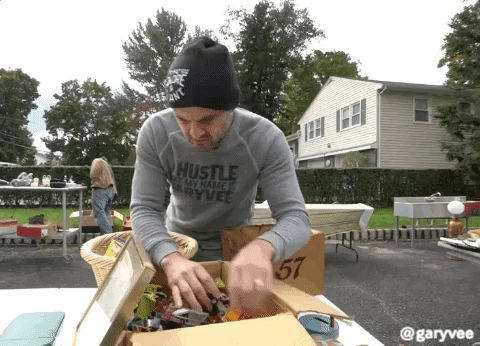
I do it because I love it.
Sales has been the foundation of my career. It’s what helped me grow my family’s liquor store. It’s what helped me grow my agency, VaynerMedia.
Knowing how to sell is the bedrock of all business.
Here’s why I love it, and some mindset shifts to help you sell more effectively over the long term:
Sales is fun when you sell something you believe in
Selling isn’t scary.
Selling something you don’t believe in is.
To me, it’s fun. I sell Vayner4Ds tickets, books, conference tickets, VaynerMedia’s services to big clients, sneakers, and more.
When you’re selling something you don’t believe in, it gets a lot harder. I’ve been in many meetings where I can tell the person on the other end isn’t bought into what they’re selling — and it shows. Those people hedge so much in their own pitch without even knowing it, and it kills their chances of actually winning customers.
I spent a long time learning about wine before talking about wine or starting WineLibraryTV. I needed to believe in what we were doing.
At Wine Library, it was that we made great wine for lower cost than everyone else. We were giving people a better deal. It’s part of what helped me aggressively sell our products through Google AdWords back when it was underpriced.
Recently, I started another wine company called Empathy Wines.
I did a live stream on my birthday where I did a QVC-style call-in show answering people’s questions, and selling Empathy Wines packages. I really believe in this because we’re producing $40 wine for $20 — and making great wine more accessible to people without big budgets.
It makes it easier (and more fun) to sell when you believe in what you’re doing.
The best sales strategy is branding
Some people think I’m against selling because I talk about giving all content away for free – but the truth is, building brand is the best sales strategy.
That’s why even though I do sell people “directly” sometimes, I try as much as possible to avoid it.
I’m building a relationship for the long term. Everyone can have their 15 minutes of fame, or better yet their 15K instagram followers and their one great sale. Not many people can build a brand and a relationship with their audience for years to come.
Whether you’re a small business or a massive corporation, you need to start thinking about business as a long term relationship, not a single transaction.
When you’re a small business with limited resources, you do have to pander to short term sales metrics in a lot of cases. There’s not as much cash to throw around in a small business, so short term revenue matters. I have empathy for that.
But here’s the funny thing about brand: If you actually build a strong brand, you outsell any salesman any day of the week.
Ask, but have zero expectations
Selling isn’t about being pushy or turning a “no” into a “yes” – it’s about asking, but having zero expectations about how the results will play out.
Even though I’m pushing wine, sneakers, and books, I have no interest in people buying if they’re not interested in those things.


I’m comfortable with asking but I don’t expect anything. It’s an important part of selling.
One of the most fascinating aspects of all this that most people don’t understand, is that you can’t sell the unsellable. When I try to understand the ecosystem and analyze why people aren’t winning, it’s because they have built enormous mental barriers around partnering with the “right” brand, or selling to a specific CEO.
The truth is, the real world doesn’t work like that, and you can’t be romantic about who gives you the opportunity. There are a million and one reasons why a certain company or executive won’t work with you. Even if your product is 10X better than the competition.
It could be that they’re under a long term contract with someone else.
It could be that they have a very close relationship with a vendor, or that the company’s investors have an agenda for what they want to accomplish.
Of course I want VaynerMedia to work with every Fortune 100 brand, but because of the market dynamics, and complicated politics that are in play, it’s easier said than done. You have to be practical when it comes to sales, and you have to be willing to take the opportunities right in front of you.
I come into every business meeting feeling massively optimistic that the person on the other end is going to buy from me. And when I realize that they’re not going to, I immediately “check out.” I’m not romantic about it.
I talk about giving away all my content for free, but don’t be confused — I’m a salesman at heart. It’s actually the reason I try to encourage businesses to start focusing on brand as soon as possible.
It’s the best way to sell over the long term.
Would mean a lot to me if you could share this article on Twitter if you found it valuable!
February 21, 2019
Choosing a Digital Marketing Agency for Small Businesses
Sasha Group — a digital marketing agency for small businesses — is a new company we launched at VaynerX that sits really close to my heart.
My dad came to this country with virtually nothing. He didn’t speak English and didn’t have any money. We lived in a studio apartment the size of a small office with nine family members.
He got a job as a “stock boy” at a liquor store for two dollars an hour in New Jersey. For years, he saved his money and eventually bought a small liquor store himself.
Once I started working at his liquor store at 22 years old, I blew up the company to $60 million from $3 million in a short period of time.
In early 2019, I launched The Sasha Group, a small business agency named after my dad.
We assembled a team of people who have been helping small businesses grow for years. We have team members who helped a furniture company grow sales through branding, a beauty company add another $100,000 / month in revenue, a supplement company unlock real growth and scalability in business, and more.
In this article, I wanted to talk about my points of view on some big mistakes that small businesses make when they choose a digital marketing agency, and some things to think about if and when you’re planning on hiring one:
1. Find a marketing agency that has grown small businesses before
I’ve always been fascinated by people’s tendencies to listen to information and advice from people who have never actually done the thing they claim to be an “expert” at.
A lot of small businesses hire agencies that are “fancy” — agencies that might have a nice website or advertise at events, but haven’t actually done the things they claim to be able to do.
The truth is, small businesses just don’t have that kind of money to risk.
When I was growing my family’s liquor store, we had a tiny marketing budget. We were doing $300,000 in gross profit – before expenses. After all the expenses were paid, we had almost no money. We didn’t have extra cash to throw around. We had to really focus on sales.
A lot of small businesses are in a similar boat.
Try to find an someone that has actually had a small business, grew it significantly, and is now starting an agency — or at least has a huge resume of other clients who have been satisfied by their work.
When you’re growing a small business, you need a different mindset than the one you’d have when growing a big brand. With a small business, you just don’t have the same margin or room for error. The way I built Wine Library to a $60 million business with a tiny budget was by focusing my time and energy on underpriced attention. At the time, that meant buying up broad keywords on Google AdWords for really low cost. Today, it might mean running Facebook ads or Instagram story ads.
That kind of thinking makes a big difference when growing a small business.
2. Go for the right balance of quality and quantity
A lot of small business owners struggle with finding the balance between “quality” and “quantity” when hiring marketing agencies.
They assume that it’s always good to go for an agency that produces higher quantity of content for a cheaper cost.
For example, a lot of businesses would rather go with an agency that produces 800 tweets for a $12k cost instead of another agency that produces 500 for the same fee. They might feel like they’re getting more for their money because they’re getting more content for the exact same price.
It makes sense on the surface, but it’s actually a huge mistake.
The truth is, quality and experience are important variables too. I could have someone make me a painting for $5 and another person make me a painting for $5 million. The biggest variable in price would be who the person is, and how much experience they really have in their craft.
An agency that produces 800 pieces of content for $12k might actually be a “worse deal” than hiring an agency that produces 500 pieces of content for the same price if the agency that produces 500 pieces of content has more overall experience.
For example, one strategy I really believe in for small businesses is to create a “Super Bowl Commercial.” What I mean by that is, creating an “iconic”, “hero” video like Dollar Shave Club or Purple Mattress did. Videos like that shape public perception of your brand.
Producing a quality iconic video like that would take a sizable investment for a small business, and you’d want an agency that has a lot of experience in executing similar strategies.
3. The best marketing agencies are in it for the long term
A lot of agencies are motivated entirely by short term economics. They’re in it to make money right now.
As a small business owner, it’s your job to sniff out whether the agency you’re looking at working with is incentivized by quick money. They might be raising capital and need a strong “bottom line” for investors, or they might be part of a holding company that evaluates them on short term performance.
If they’re incentivized by short term gains, it won’t be as likely that they’ll care about you when you’re a customer. They’ll be more interested in acquiring you as a customer than doing good work once you actually start working with them.
With VaynerX and the Sasha Group, I’m only playing for the long term. My intention is only to be historically correct and win your trust forever.
For years, we only served big brands like Pepsi, GE, or Mondelez. We had so many small businesses asking us for help, but I didn’t want to take their money because we didn’t have a service offering ready for them. And I have no interest in taking people’s money if I can’t deliver.
That’s why it took us so long to produce an offering for small businesses.
If you have any other questions about hiring a small business marketing agency, hit up @TheSashaGroup on Twitter!
Dealing with anxiety
After receiving feedback from the community, I decided to take this article down because I did a poor job conveying my thoughts on anxiety and I apologize and take full responsibility for that. I’m sorry.
If you’re struggling with anxiety, consider getting help from a 24- hour anxiety disorder helpline.
February 19, 2019
Why Every Small Business Should Have a “Super Bowl Commercial”
Super bowl commercials are the most underpriced ad buy in all of advertising.
Even though it costs over $5 million, everyone’s attention is on it.
Here’s the cost graph for the price of a 30-second Super Bowl spot over the last decade:

This is why you see so many brands come up with creative, funny, iconic commercials for the Super Bowl — because they know virtually all of America is watching, and that their ad would play a huge role in defining how people view their brand.
But what a lot of people don’t realize is, the same concept applies for small businesses.
Small businesses won’t have budget to run an actual Super Bowl commercial, but they can create an iconic, hero, or “anchor” video around their company, and distribute it across social media for virality.
An “anchor” video is a signature video that’ll play a key role in defining what people think of your company. And if done right, it could change the trajectory of a business.
Dollar Shave Club is one of the best examples. Their “anchor” video went viral on social media, and resulted in 12,000 new signups in the first 48 hours after the debut.
Purple mattress did something similar too with their video.
Here are a few things to think about as you’re creating an anchor video for your small business:
Decide whether you want an emotional or literal viral video
There are a couple of different ways to create an anchor video:
One:
Create a “day in the life” video based around you, the founder.
Or two:
Create a funny, creative, “hero” video similar to Dollar Shave Club or Purple Mattress.
If you’re a small businesses owner, my intuition is that you’re so deeply in-tune with your customers and what they want that you’d know where to go with the direction of video and the creative messaging. Most small business owners would know the kind of message that would resonate with their audience.
But if you don’t, the best option would be to spend $20k – $30k in creative and media spend to test what works. That way, you’ll have a much better shot at hitting the mark when you produce a “Dollar Shave Club” video.
End your video with a “direct response” call-to-action
I talk a lot about building brand and why it can be so valuable to sacrifice short term sales for a long term relationship.
But I’m also empathetic to the fact that small businesses need to pander more to short term sales because of issues like cashflow. An anchor video could have tremendous impact on sales if you use it to drive back to a website or a landing page — look at how Dollar Shave Club did it in the last few seconds of their video:

Promote the video through YouTube pre-roll ads
YouTube has one of the great ad products out today: Pre-roll ads based on Google Search queries.
That means you can run your video as an ad to people who were searching for your exact product or service on Google. For example, let’s say some guy or girl searches for plumbers in Boise, Idaho. If you’re a plumber, you could literally run your video ad on YouTube to everyone who searches that term in Google – so anyone looking for plumbers in Boise will see your video while they’re watching, say, Boise State highlights on YouTube.
The reason I love this ad product so much (especially for small businesses) is that it’s intent-based. That means it’s really effective at driving sales, which is what a lot of smaller companies need.
I’m a big believer in Facebook advertising and LinkedIn, too.
If you really understand who your consumer is, Facebook and Instagram will destroy. If you’re B2B, LinkedIn will destroy.
LinkedIn’s organic reach today is where Facebook was at many years ago, and presents a tremendous opportunity for people, especially if you’re selling to other businesses.
Why most businesses won’t create viral, iconic videos
I genuinely believe that creating a “hero” or “anchor” video is one of the best investments a small business could make.
Problem is, a lot of businesses would rather continue paying $5 to $10 per click on Google AdWords because it’s lower risk. It’s easier to keep doing that instead of “risking” $30k – $50k on an anchor video. Especially when you’re producing several to see which one will “hit.”
But the ones who do will win.

